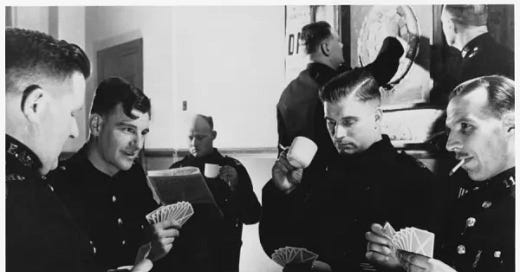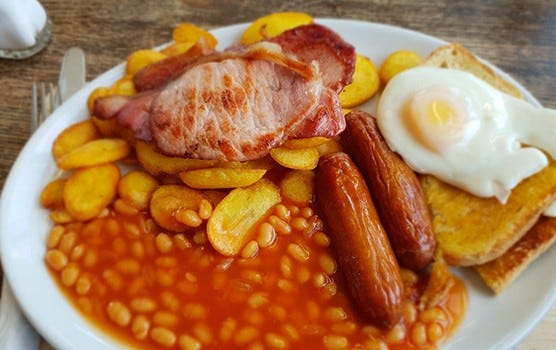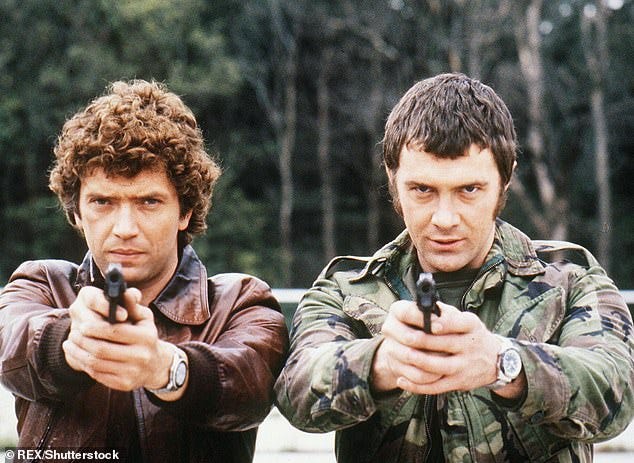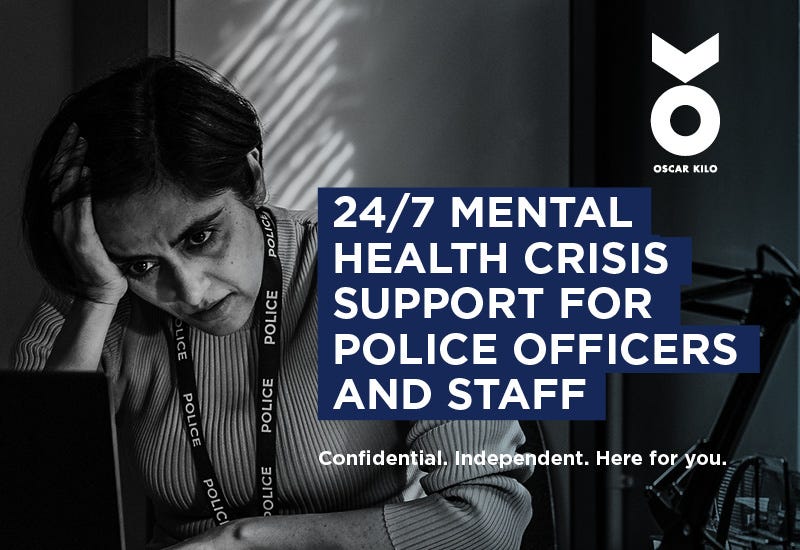An academic’s view of police canteens; ‘I say, Ken, after we’ve had a cuppa, shall we create a self-perpetuating vortex of out-grouping, othering, racism and misogyny?’
Today I shall ponder the humble police station canteen (RIP). I’ve touched upon this subject previously, in my article ‘Refs’, which discusses (among other things) the dysfunctional relationship between coppers, food and booze. However, the police canteen became more than a place where officers enjoyed subsidized fry-ups, bitching about management and sneakily scrawling penises in each others notebooks. No, it became something far more sinister.
Police canteens were, according to academics, Guardian journalists and (to be fair) more than a few disillusioned coppers, a portal to hell. Blighted cesspits, larded with hatred and intolerance. The domain of braying alphas, spraying toxicity and testosterone like dogs on lampposts. Police canteens were, it was generally agreed (usually by people who’d never set foot in one), akin to a KKK brunch filmed by Leni Riefenstahl.
Thus the term ‘Canteen Culture’ passed into popular media vernacular, a mainstay of lazy feature writers whenever police misconduct appeared in the news cycle. So enduring was the trope (or the cliché), it survived long after forces actually closed all of their canteens. Except, of course, for HQ buildings. Shiny-arses can’t think up stupid ideas without posh coffee and cake.
Now, I am aware how stereotypes usually contain a grain of truth. And so it is with the police canteen. However, the real story’s far more interesting. I would also posit Canteen Culture is, really, a lazy way of saying white, male, working-class culture because (whisper it) for a long time this was the demographic from which forces overwhelmingly recruited. This wasn’t completely due to racism, either. Why? For the simple reason the population of Great Britain was less diverse than it is now. Complaining about police canteens of yore being white, male and working class? It’s about as useful as saying the Officer’s Mess at Wellington Barracks has a preponderance of subalterns called Rupert.
And so the term Canteen Culture became a form of metropolitan, middle-class bigotry. One coined by snobs opining on police prejudice while wallowing in their own. It’s also non-partisan; the right-wing press are perfectly happy to give Old Bill a kicking about ‘The Culture’ as much as the left. Journalism, right? That completely teetotal, bully-free, ethically gleaming calling. Oh well, it’s all clickthrough ad revenue at the end of the day, innit?
I’m not completely biased. This piece isn’t simply an exercise in you-would-say-that-wouldn’t you? Yes, I was a policeman for 25 years. I retain a great deal of sympathy and affection for the workaday copper, if not the ingrates leading them into ignominy. So I’m hardly an unalloyed fanboy of contemporary policing. I’ve also helped put bad coppers in prison, so I’m not all talk. Suffice it to say, police wrongdoing - and problems with police culture - are subjects I’ve covered in depth on this Substack. I really do try my best to write things as I saw them.
American cops have donuts. British coppers have this. We win.
The typical police canteen I knew in the early 1990s was, I am reliably informed, not wildly different from the police canteen of the mid-1970s. Change was more leisurely in Britain before the internet, and that isn’t nostalgia. It really did. The canteen ladies still had cigarettes glued to their lower lips. They’d been making omelettes for coppers since the days of Harold Wilson and, therefore, had broken lots of eggs. They were unshockable. Some told jokes that made the TSG blush.
Now, I was a London copper, so my memories are of London police stations. The canteens were usually an afterthought, shoehorned into corners of Victorian or brutalist buildings (the two primary architectural flavours of London nick). Low-ceilinged, grey and dimly lit, the canteen would often overlook the station yard. Eating your breakfast, you could watch drunks stagger to the custody suite (sometimes the drunk wasn’t the duty gaoler) and SOCOs dusting stolen cars for fingerprints. Smoking was allowed, if not mandatory. The tables would be covered in styrofoam cups, half-eaten sandwiches, tabloid newspapers and copies of ‘The Job’, the Met’s in-house propaganda paper (popularly known as ‘Pravda’). The walls were papered with dull notices and official posters - all of which would be covered in carefully-drawn penises - and adverts for sports and social events (the number of dicks drawn on them would depend on the organiser’s popularity).
The canteen was also a place of drama. I remember, one night duty, walking into a police canteen to see several coppers wearing blue forensic suits (often issued to sex offenders post-arrest, and colloquially known as ‘rape suits’). The officers were involved in a violent arrest and accused of assault - their uniforms were seized as evidence by CIB (the Complaints Investigation Bureau). They were smoking, drinking tea and waiting for their Federation Rep to be scrambled out of bed. They also seem completely untroubled. One of them told me their use of force was completely warranted and, besides, ‘I don’t care if they take my trousers, I needed a new pair anyway.’
Occasionally, you’d see a young officer sitting in a corner, talking to an old sweat. The rookie might have seen their first particularly gory death, or been assaulted, or received a serious complaint. The canteen became a confessional-meets-paralegal safe space. The old sweat would tell the rookie the facts of life, buy them a cup of tea, playfully punch their arm and say if you can’t take a joke you shouldn’t have joined. Having been that rookie, a punch on the arm from the team’s oldest, sweatiest copper usually meant you were halfway to being accepted.
The canteen also acted as an informal careers service, offering a portal into the future; you’d see specialists occasionally sitting in your canteen. Some might put you off for life; I remember two traffic officers wearing motorcycle leathers. They were discussing the outrageous construction and use offences they’d found on a heavy goods vehicle. They seemed excited. I wasn’t, and decided life as a traffic rat wasn’t for me.
Then there were geezers from squads. They’d loaf in the canteen with unusual radios and outré haircuts. Even, sometimes, pistols. Sartorially, they came in three flavours - wannabe football casual, post-Miami Vice tragic and (it was the early 90s) proto-Oasis fan. They’d talk like characters from a Guy Ritchie movie, eyeing everyone else in the room with naked suspicion. The radio would crackle and they’d swagger off and climb into big, unmarked cars. Slapping magnetic ‘Kojak lights’ on the roof, they’d fuck off, kick a door in and be back to base in time for tea and medals. Then to the pub, probably. Living the Sweeney / Bodie and Doyle dream. Yes, I thought to myself (I was writing up tickets for traffic process at the time), I want some of that.
A full English and a cup of tea, please.
Yes, there was bullying. And hierarchy. Among uniformed coppers of the lowest rank, status was usually based around several factors; length of service, work ethic (are you a ‘thief-taker?’), bravery, being amusing and / or outrageous and the big one…
Driving.
Yes, I remember the last days of the ‘Drivers Table,’ which by my time was a shadow of its former self. An era when a pecking order based on driving status ruled canteens like papal decree. Now, I joined the police at a time of seismic cultural change (policing has one every year or two). The Met introduced a program called ‘Plus’, designed to make the average London policeman less of a cynical bastard. To, at last, drive a stake through the heart of the canteen culture. In my experience, asking coppers not to be cynical and inclined to bastardry is like asking lawyers not to be cautious, or estate agents not to fib about the size of ‘bedroom 3 / home office.’
When dinosaurs roamed the earth, advanced drivers had their own table. Van drivers had their own table too. The rest of the team could sit at their own fucking table with the keys to their crappy Rover Metro panda cars. If you needed to talk to the ‘Class One’ drivers you’d approach their eyrie, clear your throat and wait to be spoken to. I’m deadly serious. I also thought it was pretty bloody stupid, as some drivers were lazy bastards. There was a running joke they never took a pen anywhere, because the idiot in the passenger seat did all the writing. Anyhow, the Driver’s Table died. The older drivers retired or went to other roles in their dotage. Area car driver was still a job with status, but it was no longer godlike.
I suspect the vestigial spirit of the Driver’s Table was part of the canteen culture legend. Some officers wanted to keep the flame alive, seeing themselves as part of an elite-that-never-was myth. They elided status with bullying. Yes, there were arseholes in police canteens. The problem was, some of them were very capable street coppers (I know, this Substack is a repository of uncomfortable truths). They usually viewed policing in Manichean terms; you’re either-with-us-or-against-us. If you didn’t fit in? You couldn’t be trusted. You were a risk. Risks had to be managed. Yes, it’s basically a less dramatic version of ‘A Few Good Men.’
Perhaps people walk into policing thinking it’s going to magically change just for them. Some of it might, depending on how you play the game. Yet the nature of the beast is… the nature of the beast. Policing’s a horrible job. It changes people, some of whom need to be managed informally. And they were - I’ve seen bullies and wrong ‘uns have ‘their legs done’ with exquisite artistry by wily old coppers. Nature, if left alone, often heals itself.
I had the advantage of being counselled, in the corner of a police canteen, by an old sweat. Someone who told me the facts of life. I’m not sure many young coppers do nowadays. They certainly don’t have canteens to be counselled in.
Shut the canteen. Put up some posters instead. Job done, right?
As for the most egregious examples of a police culture gone wrong? Wayne Couzens (whose case, in my opinion, should’ve re-opened the debate around capital punishment) wasn’t hatched into the world I described, was he? He wouldn’t have seen ‘the culture’ I did. Couzens joined the enlightened, HR-managed, post-canteen police. The grievance procedure, hands-off management police. The post-sweaty sergeant police. And, despite its awfulness, the post drivers table police. At this point, I’d be interested in what other officers of my generation (or older) think. As per my last article on the use of force, would someone like Couzens have been managed differently 30-odd years ago? Maybe he’d have slipped under the radar in any case?
I do wonder. You see, perhaps the sweaty, horrible bastards from the driver’s table might have intuited a wrong ‘un. After a conference in (yes) the canteen, on a quiet night duty, an informal ‘action plan’ might have been agreed. The wrong ‘un might have found himself in a spot of bother. He might even have decided to find another line of work. One where he didn’t have a warrant card.
I’ve made the point before, of how keen we are to blame a ‘culture’ and not poor pay, mediocre management, querulous HR procedures, austerity and non-existent vetting. No, it isn’t canteen culture killing the police nowadays. It’s management culture. One of neglect, spreadsheets, jargon and procedures. One where appearances are more important than keeping the streets safe. And if there are mistakes? It’s the culture, right? Not the leaders. Not the society we expect police to keep a lid on.
Anyway, I knew the end was near when they turned the canteen at New Scotland Yard into a ‘Met Café’, with six types of coffee and overpriced croissants. I remember sitting with other grumpy coppers, muttering how the job was fucked. Old sweats, dreaming of police Valhalla; a place of endless fried breakfasts, sweet milky tea and canteen ladies making omelettes dusted with fag ash. A place of ribald humour and dicks scrawled on walls. A place for letting off steam. A place we took a break from some actual police work. Maybe I’m being nostalgic, but that’s how I remember it.
Anyway, I’m off now - I suddenly fancy a full English and a pint.
Apologies for not posting for a week or so. I’ve been writing for UnHerd; I’ve covered terrorism here and here. I’ve also written about ongoing IOPC shenanigans concerning firearms officers here.








Another policing nail bashed squarely on the head. To answer the question, yes it was the same mid-seventies, albeit canteens north of the border already few in number disappeared quicker ... but the same HQ one lingering a bit longer - what a coincidence. I did have the pleasure however of experiencing a few E&W cop canteens including the Met (not to mention the equally unique experience of the 'Section House') and can - as a visitor - corroborate that nicely painted picture. Halcyon days through rose-tinted gregory's perhaps but, as usual, policing tends to eject the baby along with the dirty bathwater. Nice one Dom.
Interesting how the abolition of canteens seems to match the near vertical climb in the deteriorating collective mental health of uniform front line cops. One wonders if Teresa May et al now living off a generous pension scheme and maximising private income would recognise the incalculable harm they've done? I think not because they don't care. Cold cruel vicious ideological fanatics who deliberately attacked those unable to resist or defend themselves. No wonder folks are Turing to Reform..